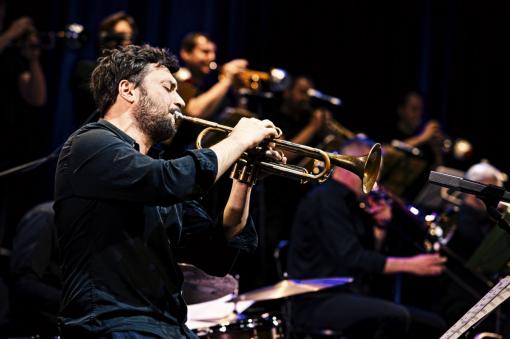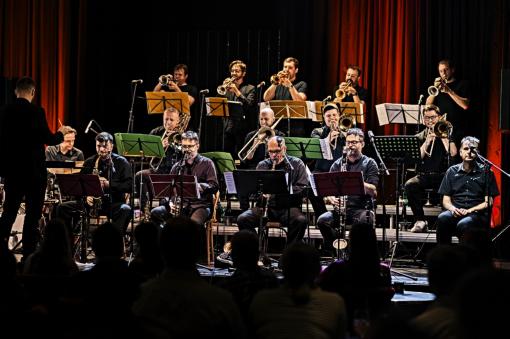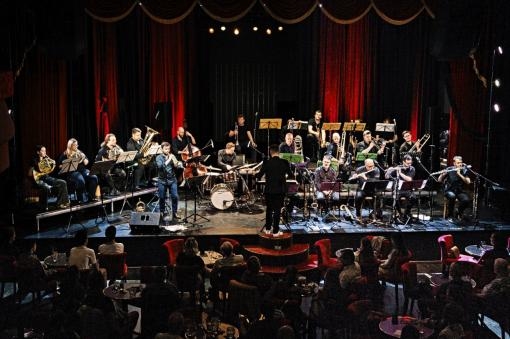Another in a series of themed “anniversary” orchestral concepts by Jiří Kotača for his big band, this one commemorates the centenary of the birth of Canadian-American jazz pianist, composer, bandleader, and above all, genius arranger Gil Evans and his successful collaboration with legendary trumpeter Miles Davis in the late 1950s.
A native of Toronto, Canada, and an admirer of Duke Ellington and Louis Armstrong, Gil (Ian Ernest Gilmore, to be exact) Evans formed his first band while in college. He landed a job in New York and became a sought-after arranger for “mid-sized” jazz ensembles. He became a pioneer of cool jazz, free jazz, and bebop (as early as 1949 and 1950, he recorded a dozen pieces with Miles Davis and the Count Basie Orchestra for Capitol Records, which were released under Davis’ name in 1957 as Birth of the Cool). After the move to Columbia Records, producer Avakian offered Davis the opportunity to choose an arranger, and he immediately suggested Evans. From their congenial collaboration came a trio of albums, Miles Ahead (1957), Porgy and Bess (1958), and Sketches of Spain (1960). Evans brought together a studio ensemble for these recordings each time (listed on the albums as Orchestra Under Direction of Gil Evans – actually untitled) and imprinted it with his own recognizable style.

For this tribute, Jiří Kotača chose to draw from the Miles Ahead and Porgy and Bess albums, while also retaining the (not easy to rehearse and instrumentalize) traditional and long-standing Evans concept of expanding the orchestra to include tuba, horns, and various flutes from piccolo to bass flute, thus significantly developing the palette of the orchestra’s colorful sounds originally exclusively for winds except for the rhythm section (piano, double bass, drums). Jiří Kotača himself undertook the most difficult task of taking the place of Miles Davis for this occasion. Apart from mastering the musical parts of each song, this meant transferring to the stage some of the Davis charisma, an integral part of Miles’ artistic expression. What succeeded almost without fail was the performance of Cotatch Orchestra + 4. The original ensemble for this occasion, conducted by Juraj Valenčík (already successful in recording the award-winning album Bigbandová elektronika). The usual line-up (only without Martin Konvička’s piano) perfectly accepted the addition of a tuba (David Křížek), at first two, then in the second half of the concert three horns (Bianka Soukupová, Pavla Tichá, and Martin Novák) and various flutes (Láďa Muroň). The dense, big-band sound gave the large audience of the Cabaret des Péchés club a momentary glimpse of the late 1950s and the dialogue between an exceptional soloist and a great orchestra. The first five tracks (the bebop Springville, Léo Delibes’ Maids of Cadiz, Dave Brubeck’s The Duke, the balladic My Ship from Kurt Weill’s musical Lady in the Dark, and Miles Ahead, Gil Evans’ title track and only original composition on the whole album) were selected by Jiří Kotača from the Miles Ahead album and arranged as a suite. A selection from this album and the first half of the concert closed with New Rhumba – now a jazz standard, composed by Ahmad Jamal. The next five pieces featured selections from the Porgy and Bess album, including songs from the originally unsuccessful jazz opera by brothers George and Ira Gershwin. The line-up and playing style of the band has changed somewhat: the drummer has replaced the broomsticks with more percussive drumsticks, a third guest horn player has been added to the line-up, some instrumentalists have occasionally replaced the clarinet with a flute, and saxophonist Marek Kotača has been given the opportunity to solo. Songs belonging to the golden fund of jazz were played: Buzzard Song, Gone, It Ain’t Necessarily So, Prayer (in which Jiří Kotača came closest to Miles Davis’ playing – and it was beautiful) and the closing Summertime.

The numerous line-up struggled to fit on the small stage (conductor Juraj Valenčík had only a modest radius of action), but this provided for closer contact with the enthusiastic and receptive audience, which the orchestra heartily enjoyed. Another symbolic and very dignified celebration was added to the many tributes to jazz greats (Duke Ellington, Charlie Parker, Dave Brubeck, Louis Armstrong, Stan Kenton, and others).
































No comment added yet..